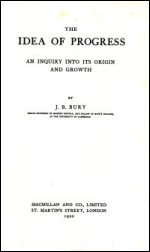Concept
The Idea of Progress
| [openbook booknumber=”OLID:OL24758863M” templatenumber=”4″] |
 |
“This idea [Progress] means that civilisation has moved, is moving, and will move in a desirable direction.”
[J. B. Bury – “The Idea of Progress: an inquiry into its origin and growth”. London, 1920, p.2]
“The idea of human Progress […] is a theory which involves a synthesis of the past and a prophecy of the future. It is based on an interpretation of history which regards men as slowly advancing – pedetemtim progredientes – in a definite and desirable direction, and infers that this progress will continue indefinitely. And it implies that, as
the issue of the earth’s great business,
a condition of general happiness will ultimate be enjoyed, which will justify the whole process of civilisation; for otherwise the direction would not be desirable. There is also a further implication. The process must be the necessary outcome of the physical and social nature of man; it must not be at the mercy of any external will; otherwise there would be no guarantee of its continuance and its issue, and the idea of Progress would lapse into the idea of Providence.”
[J. B. Bury – “The Idea of Progress: an inquiry into its origin and growth”. London, 1920, p.5]
“It is to be observed that in these socialist theories [Saint-Simon, Robert Owen] the conception of Progress as indefinite tends to vanish or to lose its significance. If the millennium can be brought about at a stroke by a certain arrangement of society, the goal of development is achieved; we shall have reached the term, and shall have only to live in and enjoy the ideal state – a menagerie of happy men. There will be room for further, perhaps indefinite, advance in knowledge, but civilisation in its social character becomes stable and rigid. Once man’s needs are perfectly satisfied in a harmonious environment there is no stimulus to cause further changes, and the dynamic character of history disappears.
“Theories of Progress are thus differentiating into two distinct types, corresponding to two radically opposed political theories and appealing to two antagonistic temperaments. The one type is that of constructive idealists and socialists, who can name all the streets and towers of “the city of gold,” which they imagine as situated just round a promontory. The development of man is a closed system; its term is known and is within reach. The other type is that of those who, surveying the gradual ascent of man, believe that by the same interplay of forces which have conducted him so far and by a further development of the liberty which he has fought to win, he will move slowly towards conditions of increasing harmony and happiness. Here the development is indefinite; its term is unknown, and lies in the remote future. Individual liberty is the motive force, and the corresponding political theory is liberalism; whereas the first doctrine naturally leads to a symmetrical system in which the authority of the state is preponderant, and the individual has little more value than a cog in a well-oiled wheel: his place is assigned; it is not his right to go his own way.”
[J. B. Bury – “The Idea of Progress: an inquiry into its origin and growth”. London, 1920, p.235-237]
| [openbook booknumber=”OLID:OL24758863M” templatenumber=”4″] |
 |
“Progress, perhaps the fundamental secular belief of modern Western society, has come under heavy fire recently because, after three centuries, advances in science and technology seem increasingly to bring problems in their wake: alienation, environmental degradation, the threat of nuclear destruction. The idea of progress is brought into question by postmodern critique, attacking the notion of science as truth. Yet no other meaningful organization of humankind’s sense of time looms on the horizon.”
[Leo Marx & Bruce Mazlish – “Progress: Fact or Illusion”, Ann Arbor, 1996]


Leave a Reply